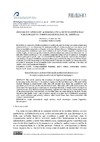Please use this identifier to cite or link to this item:
https://accedacris.ulpgc.es/jspui/handle/10553/70451
| DC Field | Value | Language |
|---|---|---|
| dc.contributor.author | Flores Acuña, Estefanía | en_US |
| dc.date.accessioned | 2020-02-21T12:08:46Z | - |
| dc.date.available | 2020-02-21T12:08:46Z | - |
| dc.date.issued | 2017 | en_US |
| dc.identifier.issn | 2386-8635 | en_US |
| dc.identifier.uri | https://accedacris.ulpgc.es/handle/10553/70451 | - |
| dc.description.abstract | El presente artículo constituye un análisis de aquellas lexías que consideramos más representativas de las situaciones de monoparentalidad protagonizadas por una mujer en el discurso mediático generado en España en las tres últimas décadas. Utilizaremos para ello un corpus específico conformado por textos extraídos de cuatro diarios españoles disponibles en versión digital, el cual nos aportará datos de distinta naturaleza sobre el uso discursivo de las unidades léxicas analizadas y nos permitirá comprobar cómo influye la prensa en la imagen estereotipada que se pueda tener de este modelo de familia. Entre las conclusiones obtenidas, cabe destacar la mayor visibilidad y menor ocultamiento social del fenómeno en el último bienio analizado, la evolución en el tipo de temáticas donde dicho modelo familiar adquiere relevancia, así como la asociación de determinadas lexías con exclusión social y pobreza, y de otras, en cambio, con empoderamiento femenino. | en_US |
| dc.description.abstract | This article analyzes the structures of single-parent families headed by women by focusing on the discourse of the media in Spain over the last thirty years. This goal will be reached through a corpus-based study that will provide data, from the quantitative and qualitative point of view, on the selected lexical items. This study will enable us to examine to what extent the Spanish press contributes to stereotype this kind of family model. Amongst our conclusions are: (1) in the last analyzed biennium, a greater visibility and less social concealment of the phenomenon has been revealed; (2) over time there was some change in the kind of issues related to this family model; and (3) certain lexical items have been traditionally associated with social exclusion and poverty, whereas other lexical items have been associated with women’s empowerment. | en_US |
| dc.language | spa | en_US |
| dc.relation.ispartof | Philologica canariensia | en_US |
| dc.source | Philologica canariensia [ISSN 2386-8635], n. 23, p. 33-48 | en_US |
| dc.subject | 550510 Filología | en_US |
| dc.subject | 570107 Lengua y literatura | en_US |
| dc.subject.other | Prensa española | en_US |
| dc.subject.other | Monoparentalidad femenina | en_US |
| dc.subject.other | Madre soltera | en_US |
| dc.subject.other | Estereotipos sociales | en_US |
| dc.subject.other | Lingüística de corpus | en_US |
| dc.subject.other | Single motherhood | en_US |
| dc.subject.other | Single mother | en_US |
| dc.subject.other | Social stereotypes | en_US |
| dc.subject.other | Corpus linguistics | en_US |
| dc.subject.other | Spanish press | en_US |
| dc.title | Análisis del léxico relacionado con la monoparentalidad femenina en un corpus de prensa digital española | en_US |
| dc.type | info:eu-repo/semantics/article | en_US |
| dc.type | Article | en_US |
| dc.identifier.doi | 10.20420/PhilCan.2017.147 | en_US |
| dc.investigacion | Artes y Humanidades | en_US |
| dc.type2 | Artículo | en_US |
| dc.identifier.ulpgc | Sí | es |
| dc.description.esci | ESCI | |
| dc.description.dialnetimpact | 0,0 | |
| dc.description.dialnetq | Q3 | |
| dc.description.dialnetd | D8 | |
| dc.description.erihplus | ERIH PLUS | |
| item.grantfulltext | open | - |
| item.fulltext | Con texto completo | - |
| Appears in Collections: | Artículos | |
Page view(s)
54
checked on Jan 10, 2026
Download(s)
84
checked on Jan 10, 2026
Google ScholarTM
Check
Altmetric
Share
Export metadata
Items in accedaCRIS are protected by copyright, with all rights reserved, unless otherwise indicated.
